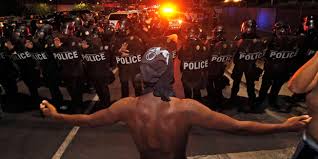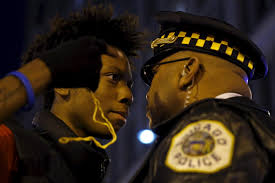Stopped by the Police – What should you do?
As the summer heats up, it may be useful to consider the the issues between the Police and the Community before the next incident. Hopefully, this Article will provide some guidance.
Whether in a car, walking or just “chillin” on the corner, it is important that you know your Constitutional Rights if stopped by the Police. There are three Amendments from the United States Constitution about which you should be familiar if you find yourself confronted by the Police.
 As a general rule if you are stopped, the Police cannot search you and cannot arrest you without a warrant. If you are asked by the Police can they search you – say “No”. You have the right to remain silent – say nothing. You have a right to a lawyer. Ask for a lawyer.
As a general rule if you are stopped, the Police cannot search you and cannot arrest you without a warrant. If you are asked by the Police can they search you – say “No”. You have the right to remain silent – say nothing. You have a right to a lawyer. Ask for a lawyer.
There are of course exceptions to these general rules. If the Police believe they have probable cause, they can search you or your vehicle without your consent, and they can arrest you without a warrant. A Court will then have to determine if the search was good and if the arrest was valid.
Due to the rash of Police shootings of unarmed young Black men, here are some tips to follow:
- Stay Cool Do not argue Keep your hands in view of Police
- Do not run Do not resist Do not interfere with the Police
- Always ask, if you are free to leave Do not sign anything
In your car – If requested, show the Police your license, registration and proof of insurance.
In your home – If Police come to your door without a warrant you do not have to let them in.
On the Corner – The same rules apply. Neither your back pack nor person can be searched.
Amendment IV – “The right of the people to be secure in their persons, houses, papers, and effects, against unreasonable searches and seizures, shall not be violated, and no Warrants shall issue, but upon probable cause, supported by Oath or affirmation, and particularly describing the place to be searched, and the persons or things to be seized.”
If you are arrested, remember say nothing except to ask for a lawyer. If you cannot afford a lawyer, the government must provide a lawyer for you (“Appointed Counsel”). If you can afford a lawyer, you should be allowed to call him (“Retained Counsel”) without the Police listening.
Amendment V – “No person shall be held to answer for a capital, or otherwise infamous crime, unless on a presentment or indictment of a Grand Jury, except in cases arising in the land or naval forces, or in the Militia, when in actual service in time of War or public danger; nor shall any person be subject for the same offence to be twice put in jeopardy of life or limb; nor shall be compelled in any criminal case to be a witness against himself, nor be deprived of life, liberty, or property, without due process of law; nor shall private property be taken for public use, without just compensation.”
Be certain to review and read very carefully any papers presented to you by the Police. Again, do not sign anything without your lawyer’s approval.
Amendment VI – “In all criminal prosecutions, the accused shall enjoy the right to a speedy and public trial, by an impartial jury of the State and district wherein the crime shall have been committed, which district shall have been previously ascertained by law, and to be informed of the nature and cause of the accusation; to be confronted with the witnesses against him; to have compulsory process for obtaining witnesses in his favor, and to have the Assistance of Counsel for his defence.”
 If you believe the Police have not honored your rights or have violated your rights, make a written record, as soon as possible, of everything that took place before, during and after the search or your arrest, including the facts surrounding your release from custody. Make certain you get the names of the Police or at least their badge numbers; the number of their Police vehicles; whether they are MPD, Park Police, Capitol Police, Metro Police, etc.; and the names addresses and telephone numbers and e-mails of any witnesses, if you are able to secure them.
If you believe the Police have not honored your rights or have violated your rights, make a written record, as soon as possible, of everything that took place before, during and after the search or your arrest, including the facts surrounding your release from custody. Make certain you get the names of the Police or at least their badge numbers; the number of their Police vehicles; whether they are MPD, Park Police, Capitol Police, Metro Police, etc.; and the names addresses and telephone numbers and e-mails of any witnesses, if you are able to secure them.
Excerpts from some Cases to note:
A person is in "custody" for Miranda purposes when he "has been . . . deprived of his freedom of action in any significant way," Miranda, 384 U.S. at 444 (1966).
Because an initial seizure for no reason at all was effectuated without a warrant, the government bears the burden of proving that it was legal, Katz v. United States, 389 U.S. 347 (1967).
A person is, therefore, seized if he is restrained in some manner, either by physical force or submission to a show of authority, Terry v. Ohio, 392 U.S. 1, 12 (1968).
A warrantless search is the quintessential intrusion and is presumptively unreasonable, Silverman v. United States, 365 U.S. 505 (1961).
"Reason and reflection require us to recognize that, in our adversary system of criminal justice, any person haled into court, who is too poor to hire a lawyer, cannot be assured a fair trial unless counsel is provided to him," Gideon v. Wainwright, 372 U.S. 335 (1963).






